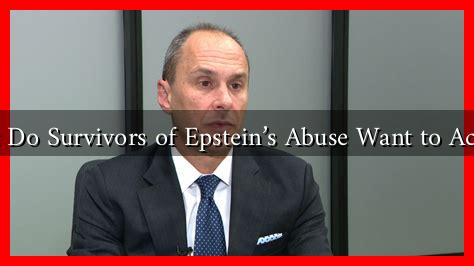-
Table of Contents
What Do Survivors of Epstein’s Abuse Want to Achieve?
The case of Jeffrey Epstein, a financier and convicted sex offender, has brought to light the harrowing experiences of numerous survivors of sexual abuse. Epstein’s network of exploitation and manipulation has left deep scars on many individuals, prompting them to seek justice, healing, and systemic change. This article explores the aspirations of these survivors and the broader implications of their experiences.
Seeking Justice and Accountability
One of the primary goals of survivors is to achieve justice for the abuses they endured. This desire for accountability extends beyond Epstein himself to include those who enabled or participated in his criminal activities. Survivors want to ensure that:
- Perpetrators are held accountable for their actions.
- Institutions that failed to protect them are scrutinized and reformed.
- Legal frameworks are strengthened to prevent future abuses.
For instance, many survivors have joined forces to advocate for legislative changes that would extend the statute of limitations for sexual abuse cases.
. This would allow more victims to come forward and seek justice, even years after the abuse occurred. The #MeToo movement has also played a significant role in amplifying these voices, encouraging survivors to share their stories and demand accountability.
Healing and Support Systems
Beyond justice, survivors are focused on healing from their traumatic experiences. This healing process often requires comprehensive support systems, including:
- Counseling and therapy services tailored to trauma survivors.
- Support groups that foster community and understanding.
- Access to resources that promote mental and emotional well-being.
Organizations like the Rape, Abuse & Incest National Network (RAINN) provide vital resources for survivors, offering hotlines, counseling, and advocacy. Survivors emphasize the importance of having safe spaces where they can share their experiences without judgment, which is crucial for their recovery.
Advocating for Systemic Change
Survivors of Epstein’s abuse are not only focused on their personal healing but also on advocating for systemic changes that can prevent future abuses. Their goals include:
- Implementing stricter regulations on sex offenders.
- Enhancing educational programs about consent and healthy relationships.
- Increasing funding for victim support services.
For example, the Epstein case has highlighted the need for better oversight of financial institutions and their role in facilitating abuse. Survivors are calling for reforms that would ensure greater transparency and accountability in these sectors, preventing individuals like Epstein from exploiting their wealth and influence to evade justice.
Raising Awareness and Changing Narratives
Another significant goal for survivors is to raise awareness about the realities of sexual abuse and to change the narratives surrounding it. They aim to:
- Educate the public about the complexities of consent and coercion.
- Challenge societal stigmas that often silence victims.
- Promote a culture of belief and support for survivors.
Survivors have utilized various platforms, including social media, documentaries, and public speaking engagements, to share their stories and advocate for change. The impact of these efforts can be seen in the growing public discourse around sexual abuse and the importance of believing survivors.
Conclusion: A Collective Journey Towards Justice
The survivors of Jeffrey Epstein’s abuse are united in their quest for justice, healing, and systemic change. Their aspirations reflect a broader movement towards accountability and support for victims of sexual abuse. By advocating for legislative reforms, enhancing support systems, and raising awareness, these survivors are not only seeking personal closure but are also paving the way for a safer future for all. Their courage and resilience serve as a powerful reminder of the importance of listening to and believing survivors, ensuring that their voices lead to meaningful change.
For more information on supporting survivors and understanding the complexities of sexual abuse, visit RAINN.





